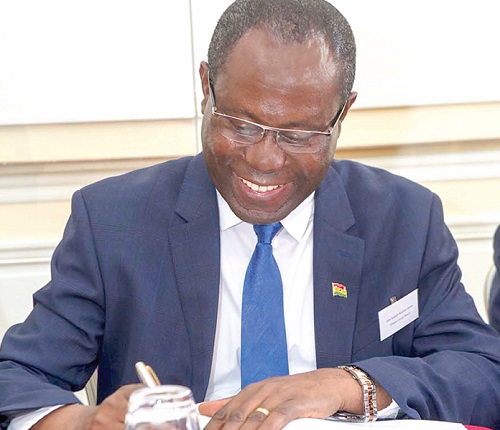Ghana and Ivory Coast will today present a united position on a fixed minimum price to sell cocoa beans to over 300 representatives of cocoa buyers and processors from around the world.
The move is aimed at making the two countries price determiners, and no longer price takers.
Persons familiar with the matter said the Accra meeting, which ends tomorrow, will be followed by another meeting in Ivory Coast from June 18-19, 2019.
Presidents Nana Akufo-Addo and Alassane Ouatarra, President of Ivory Coast, last year directed heads of cocoa industry regulators in the two countries to formulate concrete plans to co-ordinate cocoa production and marketing as part of efforts to exert more control in the market after sharp price swings in recent years.
Speculated ‘floor price’ of $2,700
A price hovering around $2,700 per metric tonne on a free-on-board basis is expected to be proposed to the buyers and processors.
The fixed minimum price, to be known as ‘floor price’, is to address income disparity in the cocoa value chain, as well as derive more value from growing the chocolate ingredient.
Smallholder farmers to benefit
This is to help farmers, the backbone of the cocoa industry, to make reasonable income to take care of family and get some margin to invest.
Backup plan
The two countries are believed to have devised strategies to deal with possible rejection by buyers and processors, but are keeping it close to their chest.
Forward sale of 80% of cocoa beans
Ghana and Ivory Coast, which account for about 60% of global cocoa output, typically sell about 80% of the main harvest before the beginning of every season, a system which allows it to lock in prices and set the minimum pay for farmers.
Over 2m small-scale farms in both countries
Over 2 million small-scale farms in Ivory Coast and Ghana produce nearly 60% of the world’s supply of cocoa.
Two-cycle cocoa season in Ghana
The country operates a two-cycle cocoa season, consisting of the main crop, which is mainly exported to Europe at a premium, and a light crop harvest, which is discounted by around 20% to local grinders.
Ghana, Ivory Coast get only $5.75bn out of $100bn chocolate market
While the two countries contributed to more than 60% of the world’s cocoa output, their total earning from the sale of cocoa beans amounted to a paltry $5.75 billion whereas the chocolate market was worth some $100 billion in that same year.
Ghana, Ivory Coast produce 60% of world’s cocoa
It means that the farmers whose toil and sweat produced 60% plus of the world’s cocoa earned 5.75% of the global value of their activity.
Nestle’s annual sales dwarfs GDP of Ivory Coast and Ghana
According to the World Bank, Ivory Coast and Ghana have combined Gross Domestic Products (GDP) of $69.3 billion, a figure dwarfed by Nestle’s $90 billion in annual sales or a market cap of around $250 billion.
London and New York terminal markets
London and New York terminal markets using mechanically programmed formulas determine the price of cocoa.
Cocoa sector contributes 4.22% to GDP
The cocoa sector contributes 4.22% of Gross Domestic Products (GDP), 30% of export earnings.
Impact of low cocoa prices
In 2017, while the price of a tonne of cocoa was $2,080 on the terminal, Ghana was paying farmers GH₵7,600, the equivalent of $1,800 using $1 to GH₵4.2 as the exchange rate.
However, the cost of subsidised inputs such as fertilisers, free spraying of farms, cost of extension services, margins for Local Buying Companies (LBC), cost of warehousing and keeping the cocoa under approved conditions moved the cost to over $2,400 per tonne of cocoa.
GH₵2.03bn loan in one season to cover price shortfalls
Due to the difference, Ghana Cocoa Board (COCOBOD) had to take a loan of GH₵2.03 billion from the Bank of Ghana (BoG).
In an attempt to reduce demand for cocoa beans, some producers are said to be using palm oil and other substitutes to replace cocoa butter.
Deforestation propaganda in Western countries
Deforestation has been a major concern of the international community, and cocoa farming has often been attacked as a cause, with some companies threatening to boycott cocoa produced in Ghana because they have been planted in reserved forest areas.
But, at the General Assembly for Swiss chocolate producers in Zurich last month, Chief Executive of COCOBOD, Joseph Boahen Aidoo charged European chocolate processing companies and international civil society groups campaigning for the protection of forests to disabuse their minds of their long-held perception that cocoa farming results in deforestation.
He stated categorically that he does not subscribe to the thinking that cocoa farming causes deforestation.
He explained that though cocoa has been planted on lands in Ghana, which in the past were reserved forests, the activities of lumbering companies reduced the forest before cocoa farmers converted the depleted vegetation to cocoa farms.
He referenced an academic research conducted into cocoa migration in Ghana and the history of the cocoa industry, which found that farmers are not responsible for the tree felling and vegetation-clearing activities that have caused the depletion of Ghana’s forest reserves over the years.
Mr Aidoo argued that in Ghana, cocoa is often intercropped with other plants, and elaborated on the unique forest-friendly cocoa farming practices that many farmers in Ghana have adopted for many years.
It is common to see cocoa crops planted among trees and along with food crops.
Monocropping as practised in places such as Ecuador is not the dominant practice in Ghana.
He went on to highlight the important contribution of cocoa plants as one of the natural means of reducing atmospheric carbon dioxide, as it is well documented that cocoa plants absorb carbon dioxide from the atmosphere and deposit carbon into the soil.
Source: The Finder

